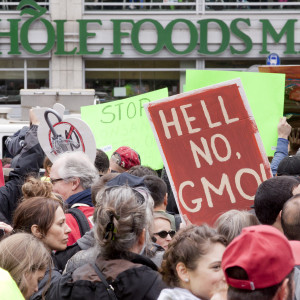A little over a month before November’s upset election, the WikiLeaks dump of Clinton campaign chairman John Podesta’s emails revealed a months-long correspondence between Podesta and a major organic foods player that speaks directly to the role the organic food industry played in Clinton’s campaign. Unfortunately for them, Donald Trump moving into the White House will mean a very different regulatory environment for Big Organic.
What WikiLeaks revealed was that Gary Hirshberg, the chairman of organic yogurt company Stonyfield, is not just the driving force behind the anti-biotech Just Label It project but was also a major (and majorly demanding) booster for Clinton’s presidential bid. Hirshberg’s messages to Podesta reveal that he and his movement expected the candidate to change her positions in exchange for their contributions.
As it turns out, it worked. Hirshberg’s cash and angry messages to Podesta ultimately made Clinton change her tune on his labeling campaign, but the payoff probably wasn’t what he was hoping for: all he had to show for his trouble was one tweet from Clinton’s account on March 16. Then again, considering how natural and dynamic the Clinton campaign was, even that was apparently an accomplishment. As Podesta put it: “We got the machinery in action and produced this tweet.”
Overall, Big Organic sided heavily with Clinton over Trump. Campaign contribution records show major industry brands like Turkey’s Nimeks Organics and Whole Foods Market poured money into her campaign. This shouldn’t come as a surprise, especially since organics have a better chance of having regulations go their way with Democrats than with the GOP. For an industry that had scored some major regulatory wins against industrial agriculture over the past year, the election results mean the tide will soon be turning.
That single tweet that Hirshberg managed to wring out of Clinton was referring to a Senate vote on a bill that would have kept Vermont from putting in a statewide food labeling law. Vermont Sen. Patrick Leahy was the main force in nixing the bill, and Vermont’s other senator (Bernie Sanders) made labeling one of his signature issues. In July, President Obama signed a nationwide mandatory disclosure law that gives the Department of Agriculture two years to come up with rules for a new system — a bill that Bernie didn’t think was extreme enough.
With the Democrats on their way out, things look set to change. Republicans on the Hill are already investigating how food-safety rules are made, and multiple committee chairs are questioning the role biased researchers and regulators play in deciding whether the government issues authorizations farmers are waiting on.
The new president-elect, of course, has tapped environmentalist boogeyman Myron Ebell to head the EPA transition and promised to ditch antibusiness environmental regulations. With his focus on reviving American fossil fuels and a team of agriculture advisers from the heartland, Donald Trump won’t have time to worry about Hirshberg’s labels or Vermont’s hydroponic farms.
Another issue for the organics lobby is whether they will keep their influence with federal regulators. Activists within the government have been suspected of tampering with regulatory findings in ways that have helped pro-organic groups, holding up authorizations and hurting traditional farmers. One heated battle surrounds the popular weedkiller glyphosate, which the United Nations’ International Agency for Research on Cancer (IARC) decided was “probably carcinogenic” last year.
Hirshberg and his campaign celebrated that decision and immediately put it to use in their lobbying efforts, but they ran into one small problem: IARC (which gets money from U.S. taxpayers through the National Institutes of Health) has become the outlier in a scientific consensus, and now Congress wants answers.
As it turns out, the U.N. agency is at odds with the European food-safety regulator, IARC’s parent World Health Organization, the Food and Agriculture Organization, and the EPA over its glyphosate findings. House Science Committee chairman Lamar Smith has been after the EPA and outgoing administrator Gina McCarthy for months over what he sees as a suspiciously disorganized approach to its own assessment, which the EPA “accidentally” published and then retracted back in April.
The plot thickened when McCarthy was accused of giving misleading testimony to Congress and misconstruing the relationship between EPA personnel and IARC.
There are allegations that anti-biotech personnel within the EPA might have used their influence to affect IARC’s results. Smith is not the only lawmaker getting fed up with what House Oversight chair Jason Chaffetz called IARC’s record of “controversy, retractions and inconsistencies.” Chaffetz’s committee will question NIH officials over the $40 million-plus in grants they have given it since 1992.
With all the flak that IARC is catching, it’s no surprise that Just Label It and partners like the Environmental Working Group have backed off promoting its glyphosate results after trumpeting them last year. With Smith and Chaffetz digging deeper and a Trump White House reshaping the EPA, organic groups are going to have a hard time pushing ahead with their anti-biotechnology and anti-pesticide agenda. For all the time and money Gary Hirshberg poured into the Clinton campaign to help him demonize industrial agriculture, he’s lost his sympathetic audience in Washington.

